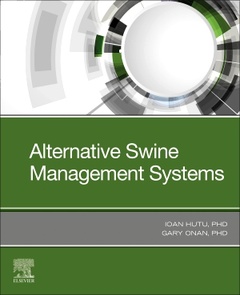Description
Alternative Swine Management Systems
Authors: Hutu Ioan, Onan Gary
Language: English
Subjects for Alternative Swine Management Systems:
160 p. · 19x23.3 cm · Paperback
Description
/li>Contents
/li>Readership
/li>Biography
/li>Comment
/li>
Alternative Swine Management Systems examines technologically humane substitutions for swine production, focusing specifically on hoop structure systems. Benefits of these alternatives include enhanced animal welfare and reduced capital cost. From small holders involved in low input pig farms, to larger commercial operations, this book instructs users on new technology to improve the quality of animal production, animal welfare and environmental protection points.
1. A Brief History of Hoop Barns2. Location, Design, and Construction3. Environmental Control and Structure Management4. Animal Management and Welfare5. Swine Production Management6. Gestation Management7. Efficiency of Swine Production
Dr. Onan received his Bachelor of Science (1971) and Master of Science (1981) in Animal Science, and then his Ph.D. (1985) in Meat Science and Muscle Biology from the University of Wisconsin-Madison. He is currently a faculty member in the Department of Animal and Food Science at the University of Wisconsin-River Falls, USA, where he teaches courses such as Introduction to Animal Science, Animal Physiology, Meat Animal Evaluation, Swine Production, and Sheep Production.
- Offers economically efficient, environmentally stable, and socially acceptable alternatives to swine farming
- Extends regions and climactic conditions for any swine farm location
- Provides an ideal resource for animal and veterinary science researchers and engineers, as well as swine farm management
These books may interest you

The Laboratory Swine 214.69 €



